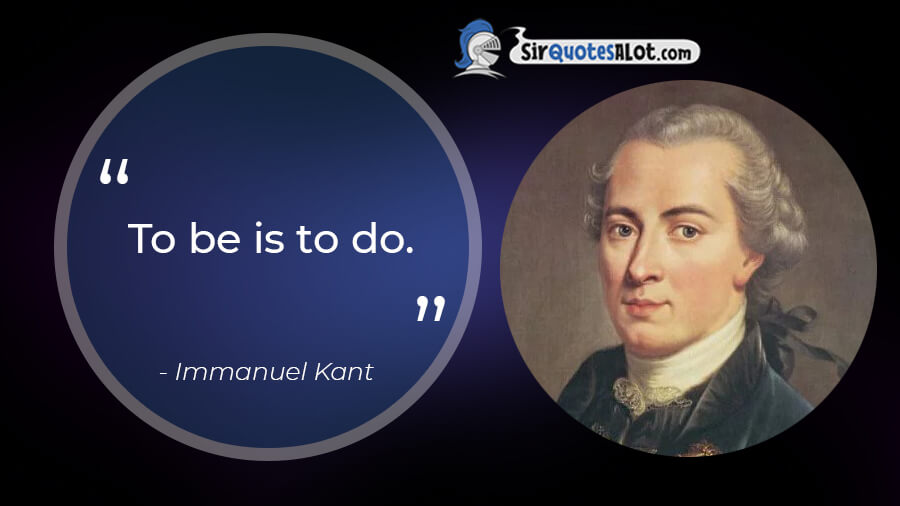Immanuel Kant, a German philosopher who lived from 1724 to 1804, is widely considered one of the most influential thinkers in the history of philosophy. His work has had a profound impact on fields ranging from epistemology and metaphysics to ethics and aesthetics. Kant’s philosophy is characterized by a rigorous and systematic approach to understanding the nature of human knowledge and the limits of human understanding.
Kant’s contributions to philosophy include his famous “Critique of Pure Reason”, in which he attempted to resolve long-standing debates about the nature of human knowledge and the relationship between our perceptions of the world and reality itself. He also developed influential theories about ethics, arguing that moral principles should be based on reason rather than tradition or personal preference.
Despite the complexity of his philosophy, Kant’s ideas have continued to be widely studied and discussed in academic and intellectual circles. His writing style, characterized by clarity and precision, has also led to many memorable and inspiring quotes that continue to resonate with readers today. In this blog post, we will explore some insightful and thought-provoking Immanuel Kant quotes, which still hold a great relevance in contemporary society.
Some of the quotes appear in the following video:
Science is organized knowledge. Wisdom is organized life.
By a lie, a man…annihilates his dignity as a man.
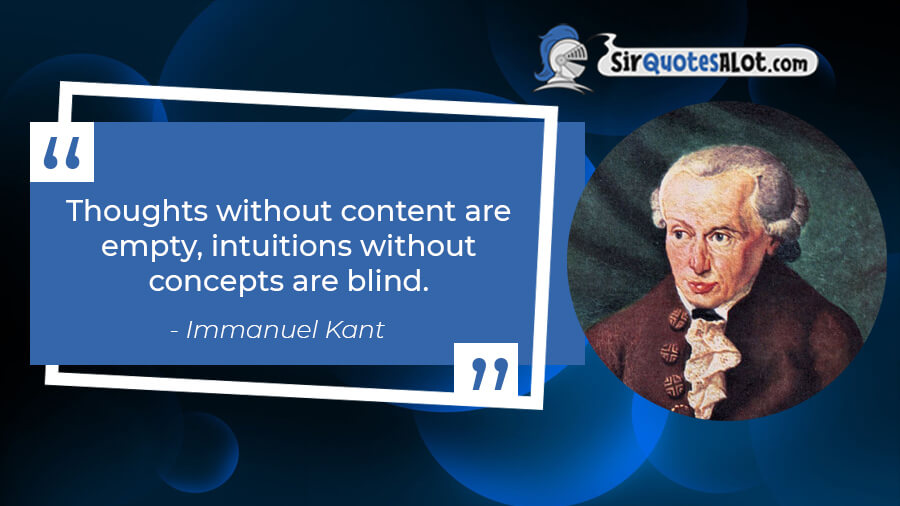
Thoughts without content are empty, intuitions without concepts are blind.
It is not God’s will merely that we should be happy, but that we should make ourselves happy.
Seek not the favour of the multitude; it is seldom got by honest and lawful means. But seek the testimony of few; and number not voices, but weigh them.
Morality is not the doctrine of how we may make ourselves happy, but how we may make ourselves worthy of happiness.
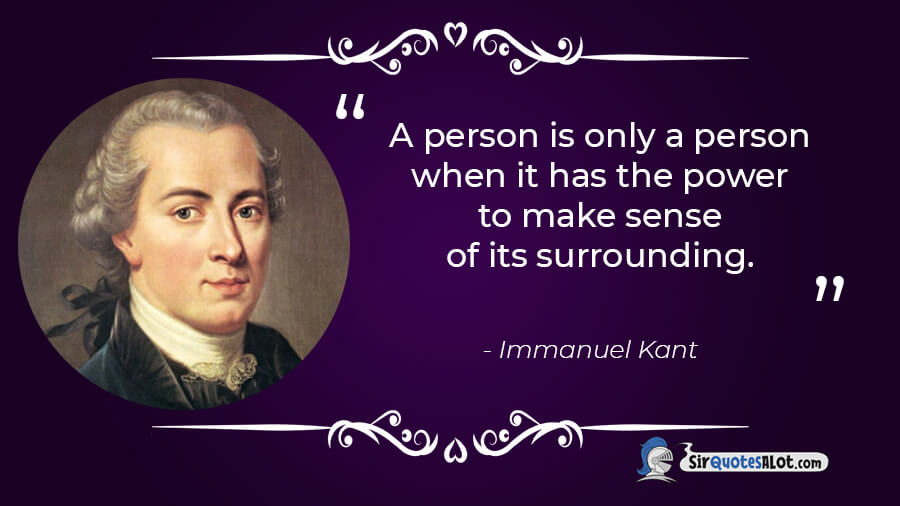
A person is only a person when it has the power to make sense of its surrounding.
So act that your principle of action might safely be made a law for the whole world.
All the interests of my reason, speculative as well as practical, combine in the three following questions: 1. What can I know? 2. What ought I to do? 3. What may I hope?
Immaturity is the inability to use one’s own understanding without the guidance of another.
Nothing is divine but what is agreeable to reason.
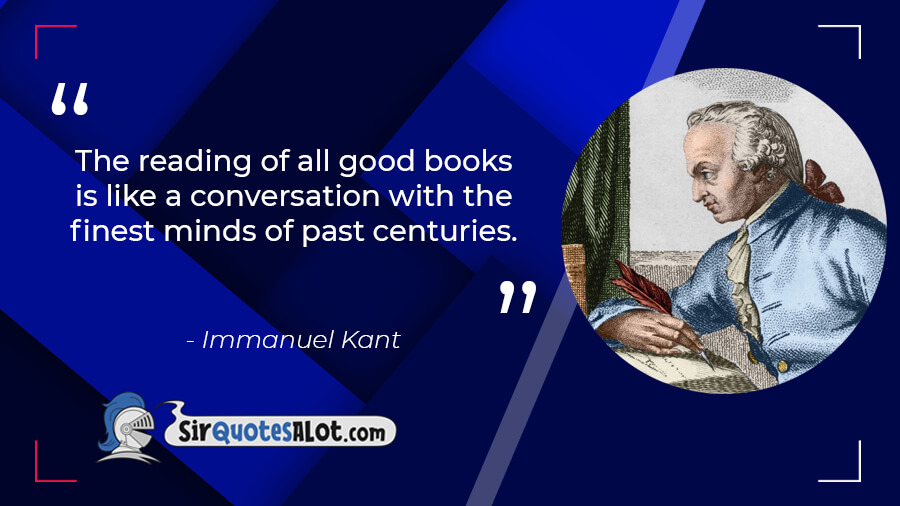
The reading of all good books is like a conversation with the finest minds of past centuries.
Out of timber so crooked as that from which man is made nothing entirely straight can be carved.
There is, therefore, only one categorical imperative. It is: Act only according to that maxim by which you can at the same time will that it should become a universal law.
All thought must, directly or indirectly, by way of certain characters, relate ultimately to intuitions, and therefore, with us, to sensibility, because in no other way can an object be given to us.
Enlightenment is man’s emergence from his self-incurred immaturity.
All human knowledge begins with intuitions, proceeds from thence to concepts, and ends with ideas.
An organized product of nature is that in which all the parts are mutually ends and means.
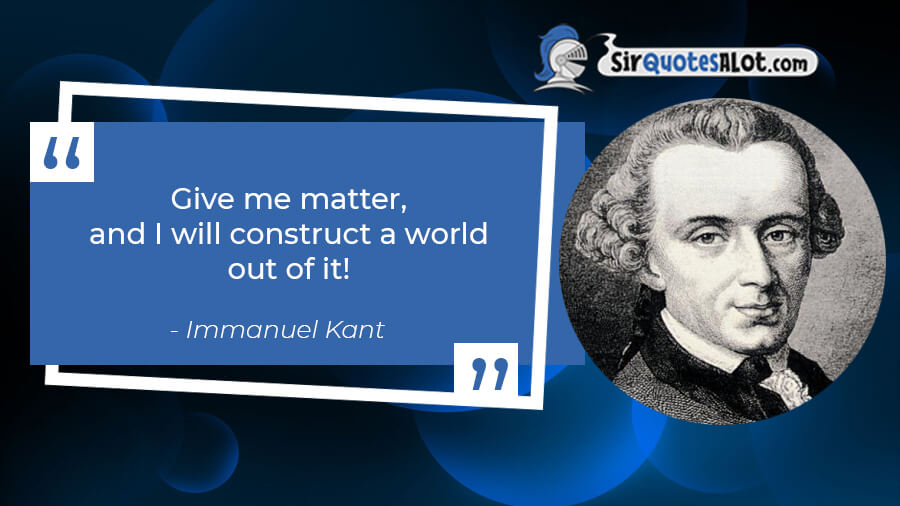
Give me matter, and I will construct a world out of it!
Nature even in chaos cannot proceed otherwise than regularly and according to order.
God put a secret art into the forces of Nature so as to enable it to fashion itself out of chaos into a perfect world system.
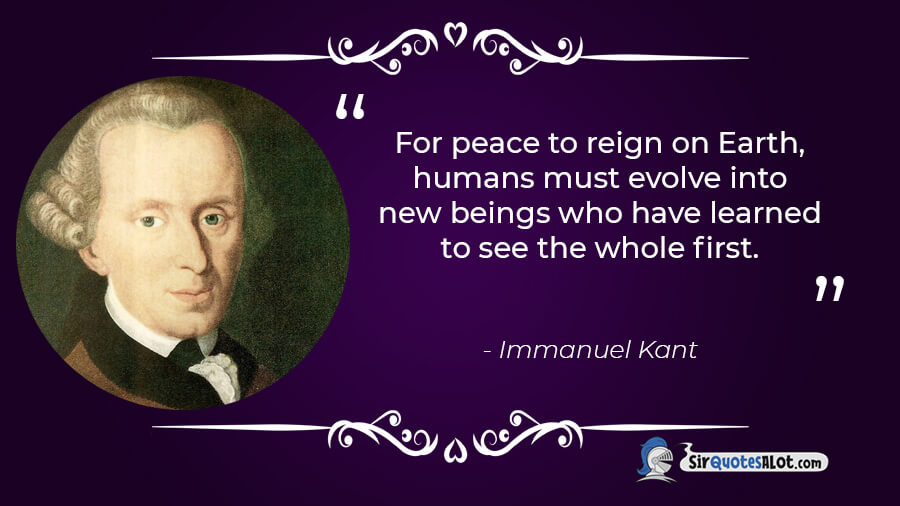
For peace to reign on Earth, humans must evolve into new beings who have learned to see the whole first.
Notion without intuition is empty, intuition without notion is blind.
Our knowledge springs from two fundamental sources of the mind; the first is the capacity of receiving representations, the second is the power of knowing an object through these representations
The ideal of the supreme being is nothing but a regulative principle of reason which directs us to look upon all connection in the world as if it originated from an all-sufficient necessary cause.
Two things fill the mind with ever new and increasing admiration and awe, the oftener and more steadily they are reflected on: the starry heavens above me and the moral law within me.
We are not rich by what we possess, but by what we can do without.
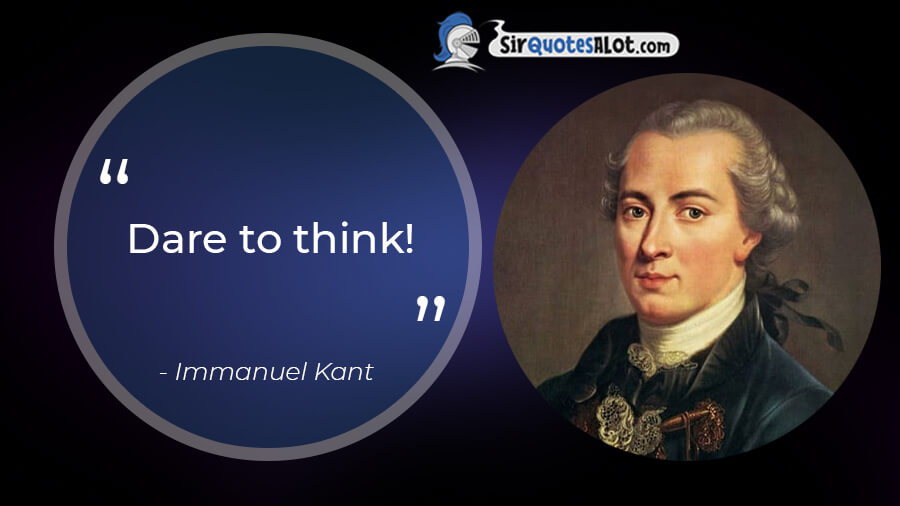
Dare to think!
Act in such a way that you treat humanity, whether in your own person or in the person of any other, never merely as a means to an end, but always at the same time as an end.
Look closely. The beautiful may be small.
The busier we are, the more acutely we feel that we live, the more conscious we are of life.
How then is perfection to be sought? Wherein lies our hope? In education, and in nothing else.
The death of dogma is the birth of morality.
Genius is the ability to independently arrive at and understand concepts that would normally have to be taught by another person.
What might be said of things in themselves, separated from all relationship to our senses, remains for us absolutely unknown.
Dignity is a value that creates irreplaceability.
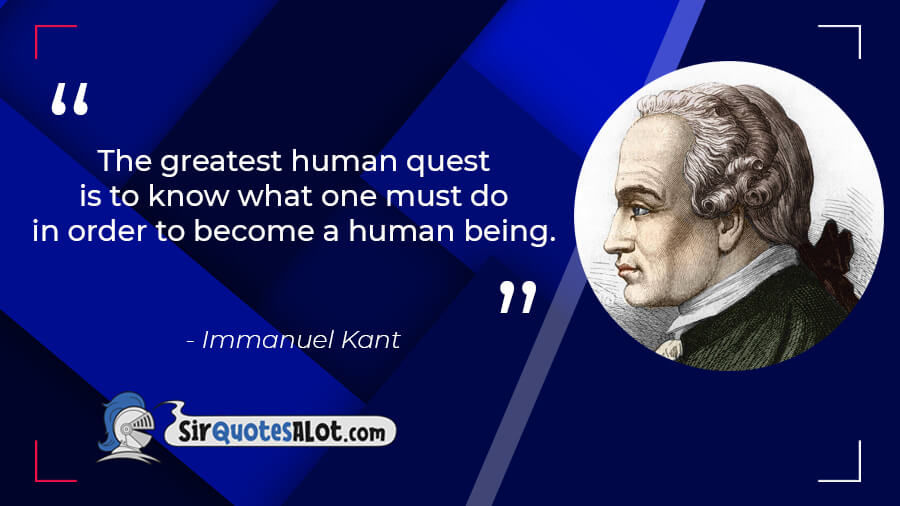
The greatest human quest is to know what one must do in order to become a human being.
Simply to acquiesce in scepticism can never suffice to overcome the restlessness of reason.
Better the whole people perish than that injustice be done.
All perception is colored by emotion.
There can be no doubt that all our knowledge begins with experience.
Maturity is having the courage to use one’s own intelligence!
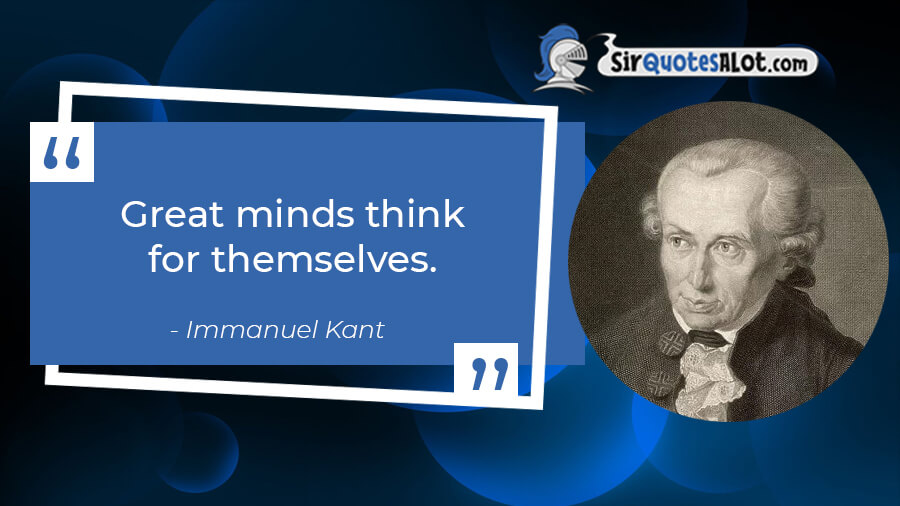
Great minds think for themselves.
One who makes himself a worm cannot complain afterwards if people step on him.
Honesty is better than any policy.
Live your life as though your every act were to become a universal law.
Life is the faculty of spontaneous activity, the awareness that we have powers.
Freedom is the opposite of necessity.
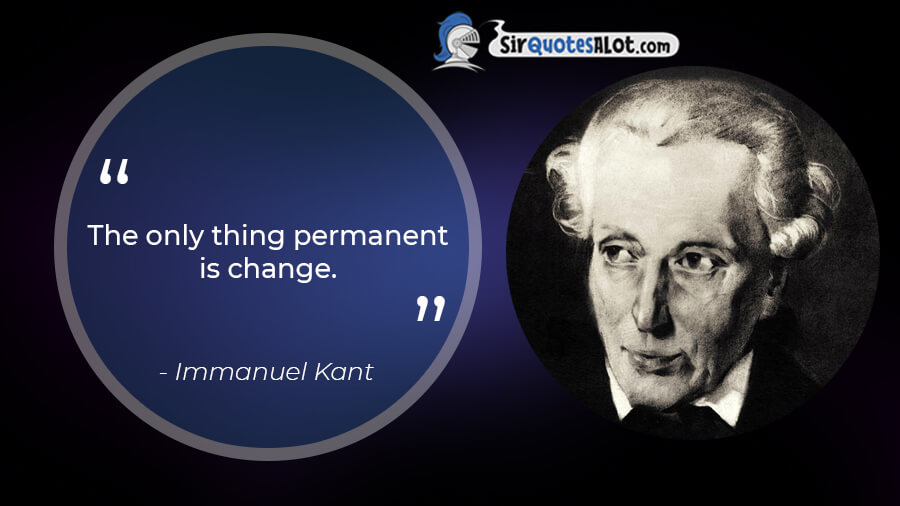
The only thing permanent is change.
Always recognize that human individuals are ends, and do not use them as means to your end.
Do the right thing because it is right.
Freedom can never be comprehended, nor even can insight into it be gained.
Freedom is that faculty that enlarges the usefulness of all other faculties.
Art is purposiveness without purpose.
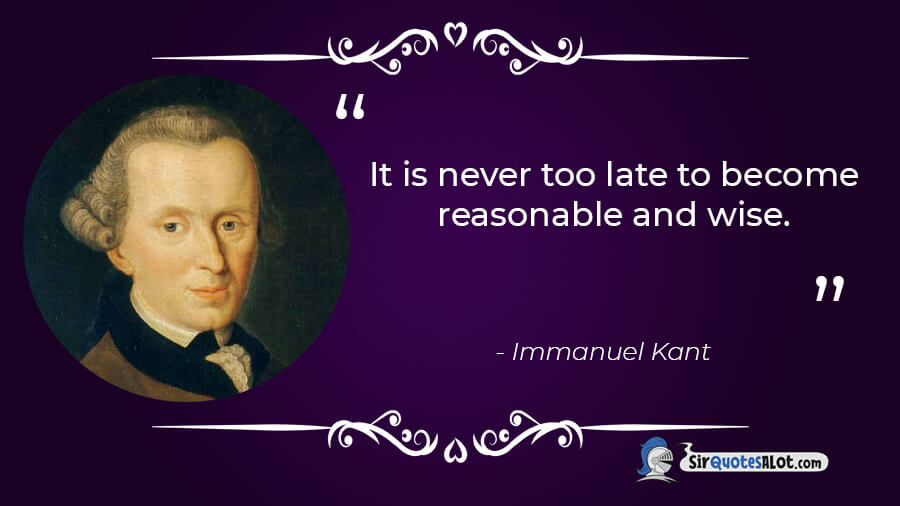
It is never too late to become reasonable and wise.
The only thing that is good without qualification is goodwill.
God, freedom, and immortality are untenable in the light of pure reason.
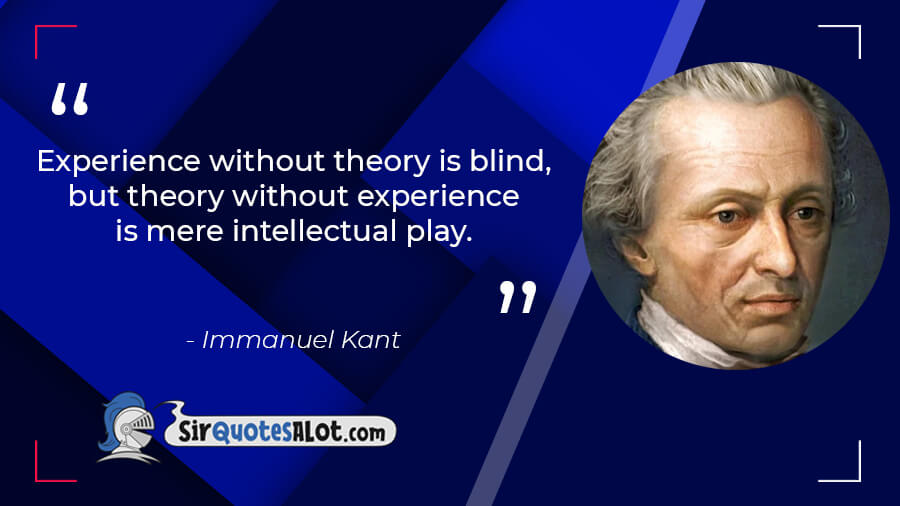
Experience without theory is blind, but theory without experience is mere intellectual play.
I had therefore to remove knowledge, in order to make room for belief.
Metaphysics is a dark ocean without shores or lighthouse, strewn with many a philosophic wreck.
To be is to do.
Out of timber so crooked as that from which man is made nothing entirely straight can be carved.
Two things awe me most, the starry sky above me and the moral law within me.
In law a man is guilty when he violates the rights of others. In ethics he is guilty if he only thinks of doing so.
Seek not the favor of the multitude; it is seldom got by honest and lawful means. But seek the testimony of few; and number not voices, but weigh them.
But although all our knowledge begins with experience, it does not follow that it arises from experience.
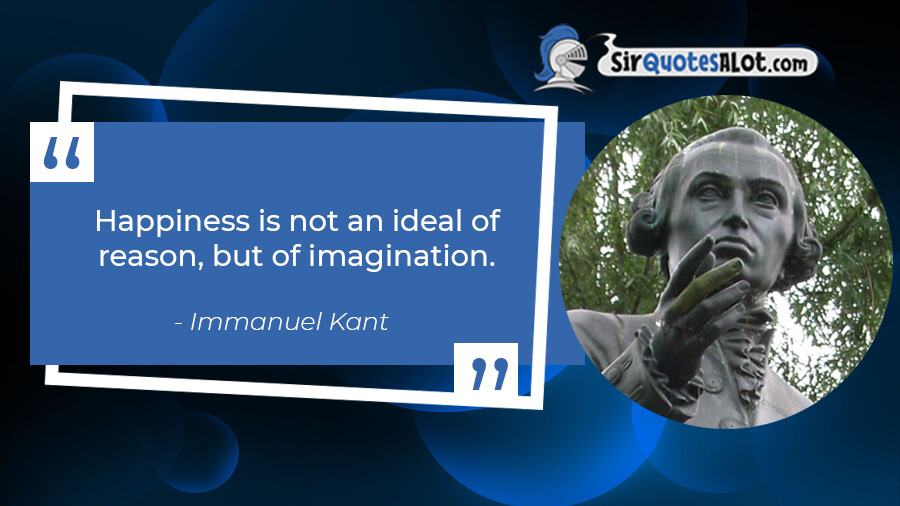
Happiness is not an ideal of reason, but of imagination.
It is not necessary that whilst I live I live happily; but it is necessary that so long as I live I should live honourably.
Religion is the recognition of all our duties as divine commands.
Even philosophers will praise war as ennobling mankind, forgetting the Greek who said: ‘War is bad in that it begets more evil than it kills.’
The people naturally adhere most to doctrines which demand the least self-exertion and the least use of their own reason, and which can best accommodate their duties to their inclinations.
Our age is the age of criticism; to which everything must be subjected. The sacredness of religion, and the authority of legislation, are by many regarded as grounds of exemption from the examination of this tribunal. But, if they on they are exempted, they become the subjects of just suspicion, and cannot lay claim to sincere respect, which reason accords only to that which has stood the test of a free and public examination.
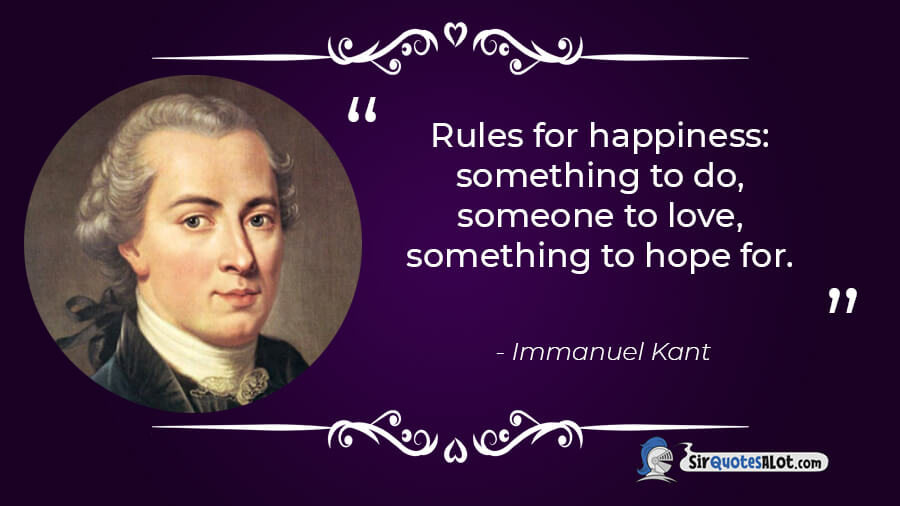
Rules for happiness: something to do, someone to love, something to hope for.
Scepticism is thus a resting-place for human reason, where it can reflect upon its dogmatic wanderings and make survey of the region in which it finds itself, so that for the future it may be able to choose its path with more certainty.
It was the duty of philosophy to destroy the illusions which had their origin in misconceptions, whatever darling hopes and valued expectations may be ruined by its explanations.
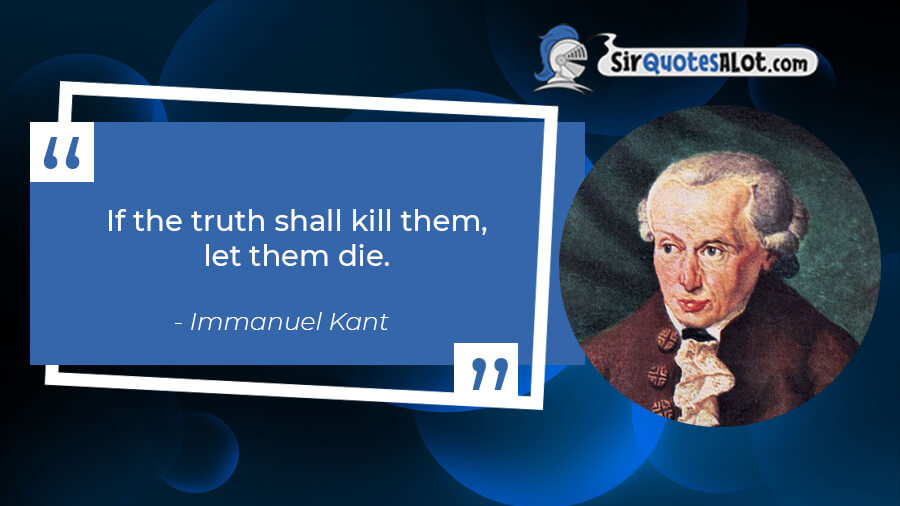
If the truth shall kill them, let them die.
Man must be disciplined, for he is by nature raw and wild.
Innocence is a splendid thing, only it has the misfortune not to keep very well and to be easily misled.
In all judgements by which we describe anything as beautiful, we allow no one to be of another opinion.
Space and time are the framework within which the mind is constrained to construct its experience of reality.
Whereas the beautiful is limited, the sublime is limitless, so that the mind in the presence of the sublime, attempting to imagine what it cannot, has pain in the failure but pleasure in contemplating the immensity of the attempt.
Interesting Facts about Immanuel Kant
After you’ve enjoyed these thought-provoking quotes, it’s time for some interesting facts about Immanuel Kant that may surprise you. Enjoy!
- He Was a Hypochondriac – Kant used to take an enormous amount of medications and read medical journals on a constant basis, hoping to connect his various conditions to what he read, one of which being constipation, with any recently discovered illness.
- Chances to Get Married – Kant could have gotten married twice, yet it took him too long to decide in both circumstances. One woman moved away from the city, and the other woman eventually married a different man before Kant could decide and make a move.
- The Struggle to Get a Tenured Position – Even though Kant was known as one of the greatest minds in history, he struggled to get a tenured position at the University of Königsberg. For 15 years, Kant had to work as a lecturer before finally getting promoted to a full professor and the chair of logic and metaphysics.
- Staying Close to Home – Kant was a physical geography professor, however, he never travelled more than 40 miles outside of his hometown. It has even been said that he has never even been to the coastline, which was only 20 miles away.
- Thinking Out of the Box – The Prussian government censored Kant’s Religion within the Bounds of Bare Reason. Kant had a brilliant idea, which was to splice the book into multiple sections and then publish it one piece at a time through the University of Jena.
For more thought-provoking quotes, please see our articles dedicated to Leo Tolstoy quotes, Osho quotes, Emily Dickinson quotes, and Pope Francis quotes.

